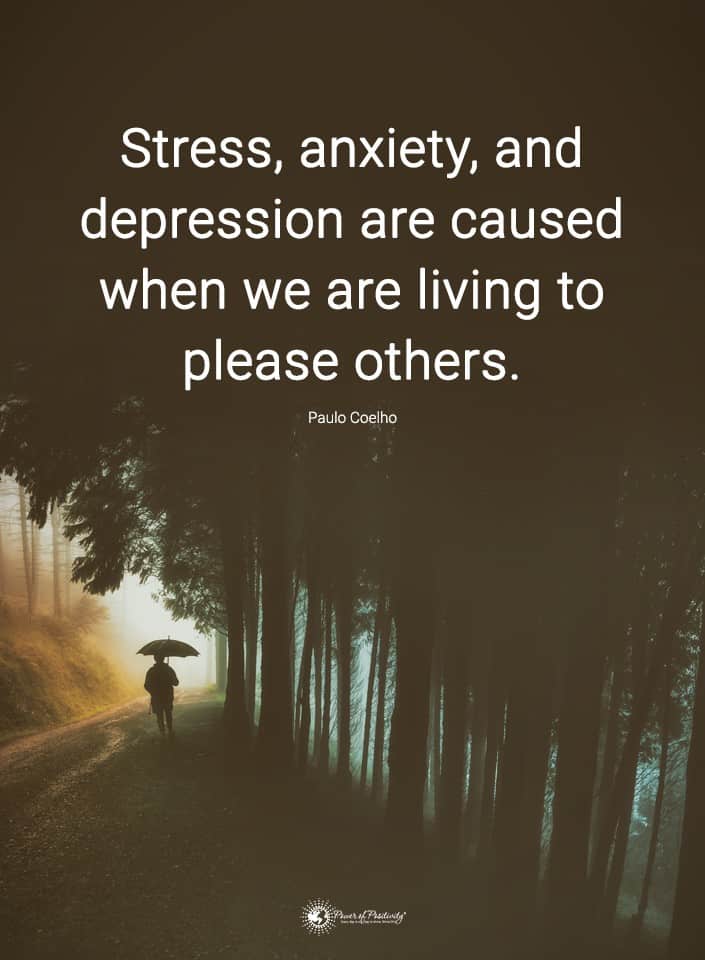It’s easy to overlook mental and emotional exhaustion. You rest when you’re physically exhausted, but when was the last time you took stock of your psychological energy? A lack of such energy can lead to a commonly misunderstood phenomenon known as burnout.
Simply put, burnout occurs when you become mentally exhausted. This is often caused by an overwhelmingly negative outlook on life that builds as you become more and more tired. Though it sounds silly, being thankful may help reduce that negativity so that you don’t get burned out as quickly.
Gratitude Can Help Prevent Burnout and Stress–Here’s How
Here are seven ways gratitude helps you prevent burnout.
 1. It Helps Sleep Quality
1. It Helps Sleep Quality
Getting enough sleep is usually enough to feel rested, but sometimes sleep quality matters just as much, if not more. The quality of your sleep determines how restored you feel after a night spent snoozing. Typically, it would be best to have a long enough series of deep sleep cycles to feel restored and energized the next day.
A lack of sleep can contribute to faster experiences of burnout as you feel tired and exhausted, even when you think that you shouldn’t. Research indicates that gratitude is capable of activating a part of the brain known as the hypothalamus. The hypothalamus is a crucial component for bodily mechanisms, as it is responsible for the control of many different necessary functions. Sleep is one of them.
2. It Eases Experiences Of Anxiety
Anxiety is often a factor that exists alongside burnout. This is because it’s the body’s natural way of informing you when something is wrong. It’s like a wake-up call that sends you into fight-or-flight mode, indicating that you’re in some danger. That danger doesn’t have to be physical, either. In fact, emotional risk feels just as real and significant to the body.
Burnout and the process leading up to it involves pushing yourself to mental exhaustion. It’s natural, then, that anxiety begins to mount as you approach the point of burning out, as it attempts to warn you. The problem, of course, is that pressure can also speed up the arrival at burnout point because the stress from those emotions can mess up your psychological state.
Reducing anxiety can help prevent burnout because it minimizes the fight-or-flight reaction, giving you time to properly assess your situation with a logical mind before the adrenaline begins to surge. Gratitude can help with that, too.
Gratitude pushes your brain to focus on positive thinking, good feelings, and optimistic thoughts. Studies indicate that those who are grateful naturally concentrate on the bright side of situations, allowing them to feel less anxious, even when confronted with significant anxiety sources such as great fears or the inevitable nature of death.
On a more scientific scale, gratitude is also capable of regulating your nervous system, especially in the sympathetic quadrants. It teaches the brain to see the good, filtering out unnecessary negativity so you can focus on either positive things or only important and realistic negative factors.
3. It Releases Toxic Emotions
Your feelings are always valid, but they can become a problem when they stay repressed and lingering in your mind for prolonged periods. Emotions have to be expressed, not repressed, if you want to maintain positive thinking. Burnout can come more quickly if feelings like anxiety, stress, worry, and frustration keep building up.
Gratitude is crucial in activating certain parts of the brain that can help regulate these emotions. You see, feelings are formed and experienced in these portions of the brain:
- Amygdala
- Cingulate gyrus
- Hippocampus
- Hypothalamus
- Thalamus
These are parts of the limbic system or the neocortical brain portions. When you practice gratitude, you can “light up” these parts of the brain to better manage those emotions, leading to better positive thinking. Research has indicated that gratitude can speed up mental health recovery and improvement in this manner.
 4. It Builds Resilience
4. It Builds Resilience
Resilience is a fascinating subject, and it’s a complex and psychologically proven phenomenon. Emotional resilience, specifically, is crucial to maintaining the strength necessary to fight burnout. It refers to the ability to combat stress, manage negative emotions, and overcome hurdles and difficulties. Without emotional resilience, you’ll burn out much more quickly and become very tired.
Gratitude manages to build up resilience quickly. Here’s how:
· It Helps You Find Ways To Push Forward
It’s not uncommon for people to focus a little too much on the difficulties they face. In fact, studies have long documented how individuals see their struggles more clearly than their blessings. Gratitude helps you balance your view of these factors, and ironically, seeing blessings will make it easier for you to combat struggles.
· It Creates Adaptive Coping Mechanisms
Gratitude helps to balance emotions, promoting positive ones like pleasure, satisfaction, and appreciation. These improved emotions can help fight stress and are essentially coping mechanisms that help build resilience to emotional disturbance.
· It Can Make You Happier
Happiness is a complex emotion, and it’s not something that magically comes to you. Sometimes, you have to build happiness, and that’s what gratitude does. It makes you focus on the good things in life, after all. On that note, a lot of research has indicated a clear link between happiness and emotional strength and resilience. The happier you are, the more resistant you are to usual stressors.
5. It Aids Depression Management
Burnout and depression are often comorbid. With depression and mood disorders, it can be harder to avoid burnout and see positivity in different circumstances. With burnout, you feel useless, hopeless, and lost, which contributes significantly to depression.
Gratitude isn’t a perfect cure for depression – and nothing is – but it can aid in managing low mood and depressive symptoms. This is because it shifts focus from the worst features of situations to some of the better ones.
Even on a deeper, more scientific level, gratitude has its benefits. While depression is not the most well-understood disorder, doctors know that it has its basis in neurochemistry and, of course, psychology. These factors can be helped by gratitude because:
- Gratitude makes you feel good using positive hormones like dopamine, oxytocin, and serotonin, which can correct chemical imbalances from depression.
- The apathy from depression can be removed when you actively feel good about things through gratitude.
- The loss of motivation from burnout and depression can be renewed when gratitude helps you find things you appreciate and love in life.
- Gratitude can improve your self-esteem by better appreciating yourself and your abilities, which can fight depression.
In some cases, gratitude has been an accurate and effective mechanism for the treatment of depression, which is excellent for burnout caused by or is causing it. According to research, these are the most effective practices of gratitude for this purpose:
· Gratitude Assessments
These tests help evaluate how much gratitude you feel and toward what aspects of your life. They help harness awareness of your appreciation and areas where it can be improved or increased. It can be beneficial for those who have trouble noticing their inner thoughts. It’s also a convenient way to get objective feedback without being swayed by the emotions from a potential burnout.
· Gratitude Journals
Gratitude journals are diaries where you record a few things that you’re grateful for every day. This helps your mind to focus on positive thinking, which can prevent burnout. These journals work best when you do them daily, as they train your mind and help deviate attention to good things rather than bad. This, alone, may be capable of circumventing the worst of burnout, though it is primarily effective for treating depression.
· Gratitude Meditation
This grounding technique makes you sit in silence and ponder all the things in life that you’re grateful for, whether they relate to loved ones, achievements, material items, or even the wider world. Meditation, in general, is a helpful tool for handling depression and burnout symptoms and is used to promote gratitude. It delivers a powerful alleviation from the worst of mental exhaustion.
6. It Helps You View Your Work More Positively
Jobs can get tiring, and they’re the primary source of burnout that you’ll face in your lifetime. Though all careers have their share of mentally exhausting features, some can be incredibly taxing. This is especially true for caregiving roles, such as that of:
- Nursing home workers
- Medical practitioners
- Teachers and instructors
In these jobs, gratitude has been proven to address, prevent, and even reverse burnout, according to studies. This involves decreases in the critical components of burnout, including:
- Depersonalization
- Emotional exhaustion
- Decrease in the sense of accomplishment
- Life dissatisfaction
Gratitude-based intervention is capable of helping people in intensive careers like this savor positive thinking and positive emotions. This allows them to better focus on the benefits of their work and how others’ lives are improved by it, thus allowing them to escape burnout.
7. It Helps You Self-Regulate
Self-regulation refers to maintaining balanced control over certain lifestyle habits that can become negative in excess. This includes:
- Eating junk food or emotional eating
- Drinking, smoking, and other vices
- Skipping out on routines of positive habits
Those who feel grateful experience decreases in cortisol, a stress hormone that sends the body into a fight-vs-flight mode, say studies. When cortisol levels are unbalanced, you are more likely to perform destructive actions in an attempt to gain short-term relief. Of course, that can lead to bad habits and a lack of self-regulation. In turn, this can be a gateway into addiction and a loss of health.
Gratitude helps by managing cortisol, lowering its levels so you can function in a more rational state of mind. Acknowledging little things to be grateful for can give you the relief you crave more positively than by performing negative habits.
 Final Thoughts On Some Ways Gratitude Helps You Prevent A Burnout
Final Thoughts On Some Ways Gratitude Helps You Prevent A Burnout
Burnout is a serious problem and can lead to a lot of mental health issues down the line. It’s amazing how something as simple as being grateful can save you from such a difficult experience!
Though gratitude helps prevent burnout, do note that work-life balance, sufficient rest time, and a neutral-to-positive lifestyle and environment are also key factors. So if you’re feeling burned out and gratitude isn’t enough to help you, you should speak to a mental health professional.


















